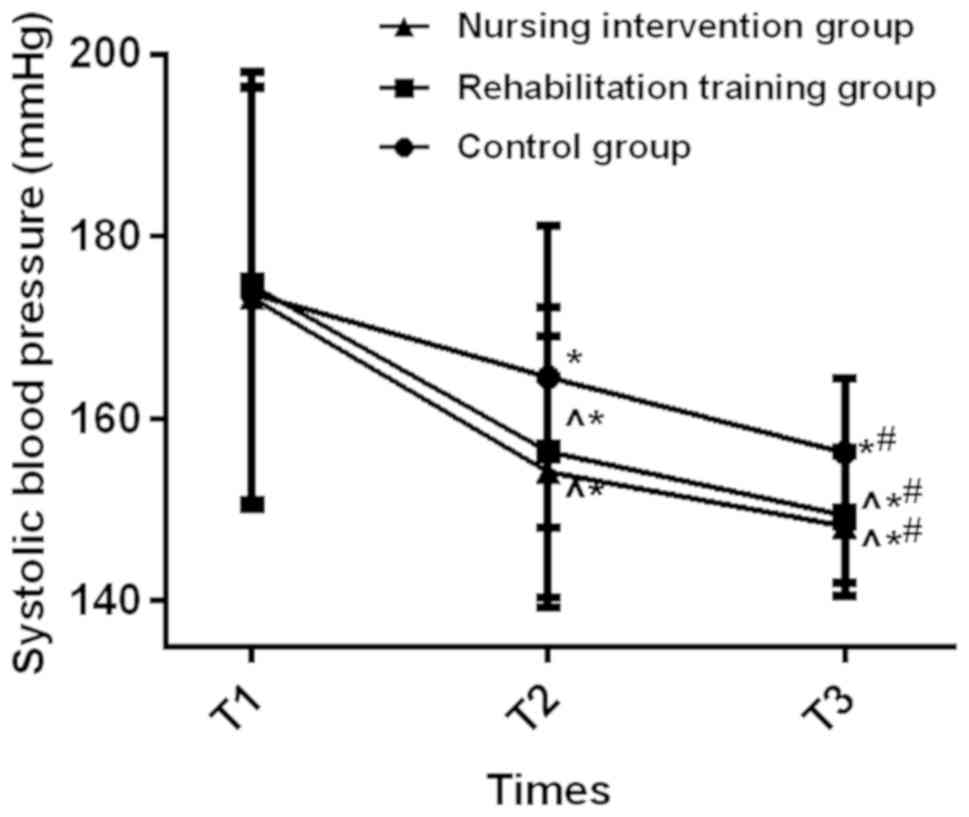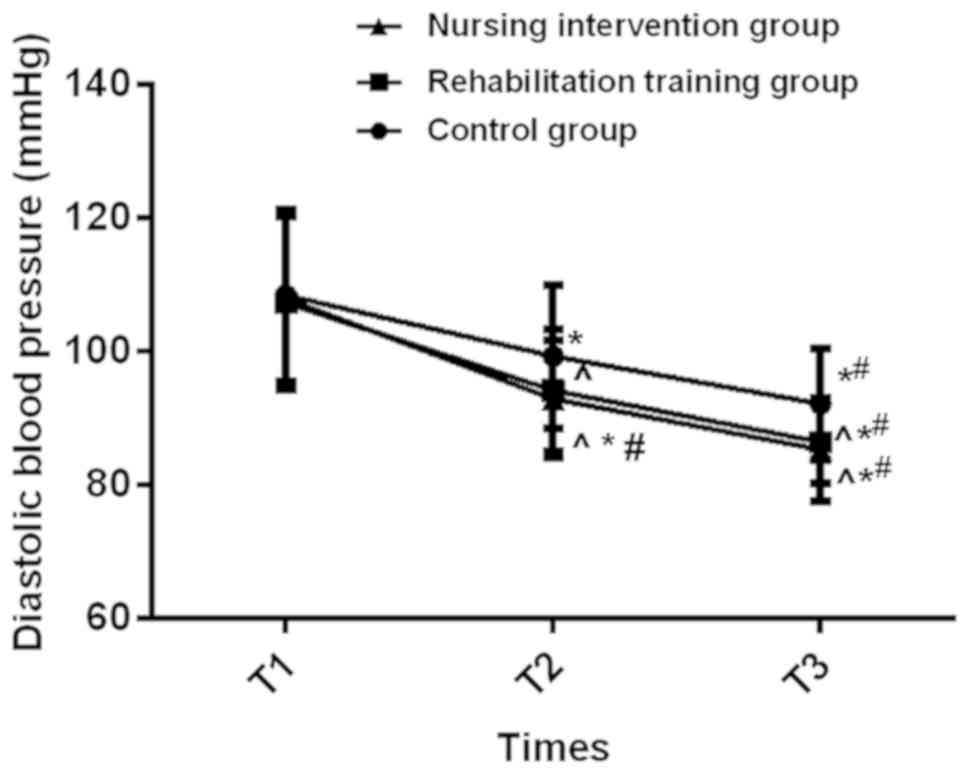|
1
|
Hemphill JC III, Greenberg SM, Anderson
CS, Becker K, Bendok BR, Cushman M, Fung GL, Goldstein JN,
Macdonald RL, Mitchell PH, et al American Heart Association Stroke
Council; Council on Cardiovascular and Stroke Nursing and Council
on Clinical Cardiology, : Guidelines for the management of
spontaneous intracerebral hemorrhage: A guideline for healthcare
professionals from the American Heart Association/American Stroke
Association. Stroke. 46:2032–2060. 2015. View Article : Google Scholar : PubMed/NCBI
|
|
2
|
Wang J, Wang G, Yi J, Xu Y, Duan S, Li T,
Sun XG and Dong L: The effect of monascin on hematoma clearance and
edema after intracerebral hemorrhage in rats. Brain Res Bull.
134:24–29. 2017. View Article : Google Scholar : PubMed/NCBI
|
|
3
|
Qureshi AI and Qureshi MH: Acute
hypertensive response in patients with intracerebral hemorrhage
pathophysiology and treatment. J Cereb Blood Flow Metab.
38:1551–1563. 2018. View Article : Google Scholar : PubMed/NCBI
|
|
4
|
Hong D, Stradling D, Dastur CK, Akbari Y,
Groysman L, Al-Khoury L, Chen J, Small SL and Yu W: Resistant
hypertension after hypertensive intracerebral hemorrhage is
associated with more medical interventions and longer hospital
stays without affecting outcome. Front Neurol. 8:1842017.
View Article : Google Scholar : PubMed/NCBI
|
|
5
|
Zhang XQ, Zhang ZM, Yin XL, Zhang K, Cai H
and Ling F: Exploring the optimal operation time for patients with
hypertensive intracerebral hemorrhage: Tracking the expression and
progress of cell apoptosis of prehematomal brain tissues. Chin Med
J (Engl). 123:1246–1250. 2010.PubMed/NCBI
|
|
6
|
Lakhan SE, Kirchgessner A, Tepper D and
Leonard A: Matrix metalloproteinases and blood-brain barrier
disruption in acute ischemic stroke. Front Neurol. 4:322013.
View Article : Google Scholar : PubMed/NCBI
|
|
7
|
Ropper AE and Chi JH: Treatment of
traumatic brain injury without direct intracranial pressure
monitoring. Neurosurgery. 72:N19–N20. 2013. View Article : Google Scholar : PubMed/NCBI
|
|
8
|
Gavito-Higuera J, Khatri R, Qureshi IA,
Maud A and Rodriguez GJ: Aggressive blood pressure treatment of
hypertensive intracerebral hemorrhage may lead to global cerebral
hypoperfusion: Case report and imaging perspective. World J Radiol.
9:448–453. 2017. View Article : Google Scholar : PubMed/NCBI
|
|
9
|
Manno EM, Atkinson JL, Fulgham JR and
Wijdicks EF: Emerging medical and surgical management strategies in
the evaluation and treatment of intracerebral hemorrhage. Mayo Clin
Proc. 80:420–433. 2005. View
Article : Google Scholar : PubMed/NCBI
|
|
10
|
Inamasu J, Nakae S, Adachi K and Hirose Y:
Angiotensin II receptor blockers following intravenous nicardipine
administration to lower blood pressure in patients with
hypertensive intracerebral hemorrhage: A prospective randomized
study. Blood Press Monit. 22:34–39. 2017. View Article : Google Scholar : PubMed/NCBI
|
|
11
|
Knecht S, Roßmüller J, Unrath M, Stephan
KM, Berger K and Studer B: Old benefit as much as young patients
with stroke from high-intensity neurorehabilitation: Cohort
analysis. J Neurol Neurosurg Psychiatry. 87:526–530. 2016.
View Article : Google Scholar : PubMed/NCBI
|
|
12
|
Shimamura N, Katagai T, Kakuta K, Matsuda
N, Katayama K, Fujiwara N, Watanabe Y, Naraoka M and Ohkuma H:
Rehabilitation and the Neural Network After Stroke. Transl Stroke
Res. 8:507–514. 2017. View Article : Google Scholar : PubMed/NCBI
|
|
13
|
Li W, Gao J, Wei S and Wang D: Application
values of clinical nursing pathway in patients with acute cerebral
hemorrhage. Exp Ther Med. 11:490–494. 2016. View Article : Google Scholar : PubMed/NCBI
|
|
14
|
Phipps MS, Jastreboff AM, Furie K and
Kernan WN: The diagnosis and management of cerebrovascular disease
in diabetes. Curr Diab Rep. 12:314–323. 2012. View Article : Google Scholar : PubMed/NCBI
|
|
15
|
Kalaria RN: Cerebrovascular disease and
mechanisms of cognitive impairment: Evidence from
clinicopathological studies in humans. Stroke. 43:2526–2534. 2012.
View Article : Google Scholar : PubMed/NCBI
|
|
16
|
Soustiel JF, Sviri GE, Mahamid E, Shik V,
Abeshaus S and Zaaroor M: Cerebral blood flow and metabolism
following decompressive craniectomy for control of increased
intracranial pressure. Neurosurgery. 67:65–72. 2010. View Article : Google Scholar : PubMed/NCBI
|
|
17
|
Xu X, Chen X, Li F, Zheng X, Wang Q, Sun
G, Zhang J and Xu B: Effectiveness of endoscopic surgery for
supratentorial hypertensive intracerebral hemorrhage: A comparison
with craniotomy. J Neurosurg. 128:553–559. 2018. View Article : Google Scholar : PubMed/NCBI
|
|
18
|
Biffi A, Anderson CD, Battey TW, Ayres AM,
Greenberg SM, Viswanathan A and Rosand J: Association between blood
pressure control and risk of recurrent intracerebral hemorrhage.
JAMA. 314:904–912. 2015. View Article : Google Scholar : PubMed/NCBI
|
|
19
|
Yu SX, Zhang QS, Yin Y, Liu Z, Wu JM and
Yang MX: Continuous monitoring of intracranial pressure for
prediction of postoperative complications of hypertensive
intracerebral hemorrhage. Eur Rev Med Pharmacol Sci. 20:4750–4755.
2016.PubMed/NCBI
|
|
20
|
Li F and Chen QX: Risk factors for mental
disorders in patients with hypertensive intracerebral hemorrhage
following neurosurgical treatment. J Neurol Sci. 341:128–132. 2014.
View Article : Google Scholar : PubMed/NCBI
|
|
21
|
Lee LC and Tsai AC: Mini-nutritional
assessment predicts functional decline of elderly Taiwanese: Result
of a population-representative sample. Br J Nutr. 107:1707–1713.
2012. View Article : Google Scholar : PubMed/NCBI
|
|
22
|
Waguchi H, Hidaka K, Shinoki K, Matsuoka
M, Mito S, Doi S, Hata A, Ibata T, Komuro R and Iijima S:
Coordination to assist with hospital-to-home discharge after
cerebral hemorrhage - perspectives of a patient's family and nurse.
Gan To Kagaku Ryoho. 40 (Suppl 2):216–218. 2013.(In Japanese).
PubMed/NCBI
|
|
23
|
Raitakari OT, Juonala M, Kähönen M,
Taittonen L, Laitinen T, Mäki-Torkko N, Järvisalo MJ, Uhari M,
Jokinen E, Rönnemaa T, et al: Cardiovascular risk factors in
childhood and carotid artery intima-media thickness in adulthood:
The Cardiovascular Risk in Young Finns Study. JAMA. 290:2277–2283.
2003. View Article : Google Scholar : PubMed/NCBI
|
|
24
|
Cavallo S, Brosseau L, Toupin-April K,
Wells GA, Smith CA, Pugh AG, Stinson J, Thomas R, Ahmed S, Duffy
CM, et al: Ottawa panel evidence-based clinical practice guidelines
for structured physical activity in the management of juvenile
idiopathic arthritis. Arch Phys Med Rehabil. 98:1018–1041. 2017.
View Article : Google Scholar : PubMed/NCBI
|
|
25
|
Bai Y, Hu Y, Wu Y, Zhu Y, He Q, Jiang C,
Sun L and Fan W: A prospective, randomized, single-blinded trial on
the effect of early rehabilitation on daily activities and motor
function of patients with hemorrhagic stroke. J Clin Neurosci.
19:1376–1379. 2012. View Article : Google Scholar : PubMed/NCBI
|
|
26
|
Stern M, Chang D, Odell M and Sperber K:
Rehabilitation implications of non-traumatic subarachnoid
haemorrhage. Brain Inj. 20:679–685. 2006. View Article : Google Scholar : PubMed/NCBI
|
















